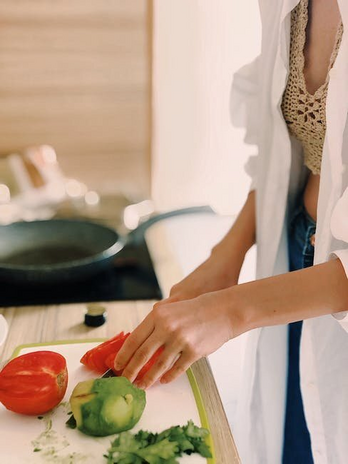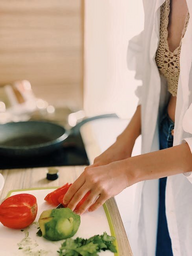Gherkins, cold cuts, baked beans, and cold pizza – some of the strong posts of the ‘Girl Dinner’ trend seen on the TikTok and Instagram feeds of, I imagine, every woman under forty in the past few months. Its composition is chaotic and unprepared, a marriage of unorthodox ingredients spontaneously thrown together as a low-maintenance meal. This movement has revealed a remarkable commonality between women across the globe, who have identified with the instinct to feed themselves in the easiest ways possible when alone. Having watched these circulating ‘Girl Dinner’ videos, I have found myself wondering whether we are endorsing the right eating habits for women, and how the ‘Girl Dinner’ might influence how we view and feed ourselves.
“No preparation, just vibes” is how the trend’s creator, Olivia Maher, regarded her ‘Girl Dinner’, comprising of French baguette with butter and cheese, pickles and grapes, and a glass of red wine to wash it down. This relatively well-coordinated ‘Girl Dinner’ has been transmuted invariably to personal preferences, friends of mine identifying ketchup packet-noodles, fish fingers with hummus and pesto on toast with salami as their go-to quick fix. The normality of meals like this, for both men and women, is appreciable; we all fall short of the sufficient time, resources or will needed to produce a recipe-led meal at times, happily poking around in the fridge for a snack-like dinner which usually does not constitute a ‘proper’ meal. It is interesting, then, that this phenomenon has been gendered and identified as a female custom, adhering to long traditions of feminising certain eating habits and diets.
Despite it being perfectly normal to sometimes have these ‘bits and pieces’ dinners when eating in alone, the ‘Girl Dinner’ risks popularising a harmful fashion of poor eating in young women. Though appearing relatable, girly and fun, the trend is threatening to glamourise unhealthy eating habits in accordance with decades of slimming diets directed at women. The ‘meals’ in these videos that have gone viral, and are being viewed by millions on social media platforms, are often consisting of a couple of crackers, ham slices and tomatoes. It may not be advertised as such, but the ‘Girl Dinner’ could be more damaging than the initial lighthearted trend it was intended to be. In posts that I have seen, what is being suggested as ‘dinner’ is a can of sugar-free red bull, or a small bowls of fries with mayonnaise, which risks taking away from the importance of our food being nourishing for our bodies, and minds. That being so, creators should keep in mind the potential impact this trend is having on influenceable young girls and women.
That being said, the internet has picked up on the potentially damaging implications of encouraging unsubstantial snack-meals like this, and many have tried to recentre the ‘Girl Dinner’ trend around soul-feeding, intuitive eating which also offers balanced nutrition. Social-media dietitians have rebranded the trend as ‘well-fed Girl Dinner’, creating meals in the same low-effort style whilst meeting dietary needs and adequate portion sizes.
Now this is a trend we can think about supporting.
So just remember, we need to be very careful with eating trends like the ‘Girl Dinner’, ensuring they don’t disguise toxic traditions of influencing women’s eating habits as a relatable ‘girly thing’. Next time you get in late and have no intention of heading into the cold to buy ingredients for a recipe, indulge yourself in your snacky, comforting plate of bits; just ensure that you have enough goodness and sustenance on that plate to keep your body happy as well as your soul.


